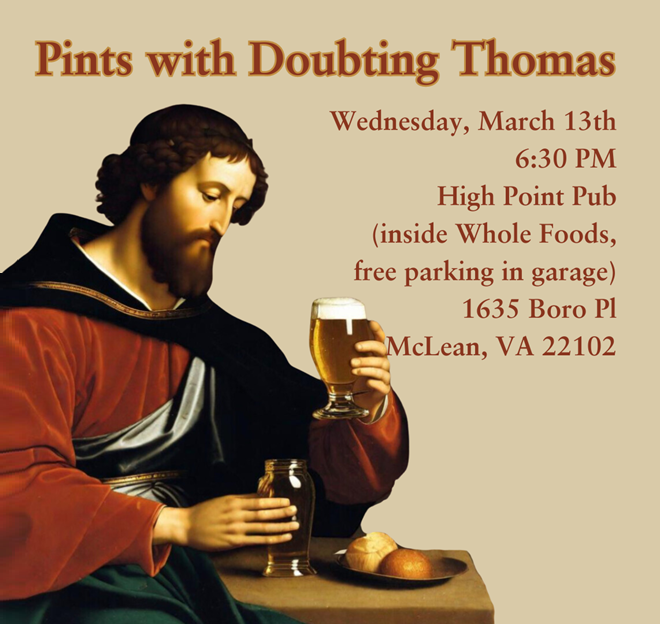
Pints with Doubting Thomas
Contributed by Stephen Wickman, St. Thomas Episcopal, McLean
One reason I belong to St. Thomas Episcopal Church is because our patron saint – known popularly as “Doubting Thomas” – reflects the broad theology of the Anglican Communion, particularly its American counterpart. Our conceit is that we uniquely straddle reformed and non-reformed Christian traditions, which is probably an unfair exaggeration, but I was reminded of this during the kickoff of a new, bi-weekly McLean tradition: “Pints with Doubting Thomas.”

The subject was “theodicy” or the problem of evil” — perhaps the biggest stumbling block to religion for many non-believers. How can a God whom we describe as supremely loving and good allow suffering and evil to exist? Or as Rabbi Harold Kusher asked in a best-selling book from 1981: what do we do “When Bad Things Happen to Good People”? https://a.co/d/hUGaInQ
Our Assistant Rector and Parish Administrator gave four answers to this dilemma, which I must admit would not perplex an atheist. First, is the idea of a “perfect plan,” which stems from the Calvinist doctrine that everything, including suffering, is part of God’s plan. Second, is the doctrine of “free will,” the dominant non-reformed view that a world of free choice is better than a world of slavish devotion and that we must have the capacity to make good or bad choices, some of which lead to suffering, etc. Third, is the idea of “spiritual warfare” between Satan – the cause of all evil and suffering – and God, who will win in the end with the help of his recruits. Finally, there is “soul-making,” the idea that although God knew free will would lead to suffering, God intends us to become better and more complete as we grow out of this purposeful and instructive suffering.
Rabbi Kushner, struggling with the loss of his own son to a horrible, debilitating disease, gravitates toward the soul-making view. “I would say that God may not prevent the calamity, but He [sic] gives us the strength and perseverance to overcome it.”
Whatever your perspective, I invite you to join us next Wednesday, March 13, to continue the discussion. This time we will consider less traditional theodicies, including anti-theodicy (the idea that we should not attempt to defend God in the face of evil). If all this sounds a bit esoteric, it goes down much better with good company and a pint of ale.
This blog post is the expressed opinion of its writer and does not necessarily reflect the views of Tysons Interfaith or its members.
Copyright 2022 © TYSONS INTERFAITH. All rights reserved.
